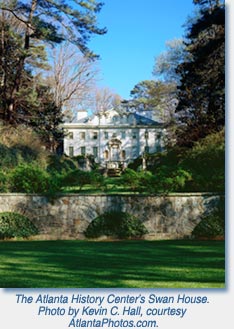 To the public, there is something undeniably intriguing about the bullet-ridden uniform of a Civil War soldier who died of his wounds 45 years after the Battle of Peachtree Creek; or the torch that carried a flame to Berlin in 1936, inaugurating an Olympic tradition but glorifying the Nazi regime; or the stone tools that the locals crafted long before Atlanta existed. Tourists' feelings are stirred when they walk through the 1928 Renaissance Revival mansion that they imagine as Tara, while a real, whitewashed, beaten-down plantation is just a few yards away, with a slave cabin behind it.
To the public, there is something undeniably intriguing about the bullet-ridden uniform of a Civil War soldier who died of his wounds 45 years after the Battle of Peachtree Creek; or the torch that carried a flame to Berlin in 1936, inaugurating an Olympic tradition but glorifying the Nazi regime; or the stone tools that the locals crafted long before Atlanta existed. Tourists' feelings are stirred when they walk through the 1928 Renaissance Revival mansion that they imagine as Tara, while a real, whitewashed, beaten-down plantation is just a few yards away, with a slave cabin behind it.
The Atlanta History Center (AHC) is a regional center of discovery, emotion, and historical perspective where visitors of all ages are challenged to think about their pasts. For scholars, it is one of the most widely respected research centers in the southeast.
Some Background
Founded as the Atlanta Historical Society in 1926, today's Atlanta History Center lies on a 33-acre campus on the edge of Atlanta's Buckhead commercial district. It offers the 115,000-square-foot Atlanta History Museum, featuring five signature exhibitions and three galleries for traveling exhibitions. Its signature exhibitions focus on Atlanta's growth from a rough-and-tumble railroad town into an international city; the colorful traditions of southern folk arts; the triumphs of Georgia's golf legend Bobby Jones; and the Civil War, the great turning point in southern—and national—history. In the Fentener van Vlissingnen Family Wing, there is the just-opened Centennial Olympic Games Museum, perhaps the most significant exhibit on Olympic sport and history in the nation. All these exhibitions and more are backed by a fascinating collection of some 40,000 artifacts, including Confederate General Patrick Cleburne's presentation sword, Margaret Mitchell's writing desk, and Ralph David Abernathy's "marching" shoes.
Research Opportunities
For professional historians, the Kenan Research Center is the main attraction on campus. The newly renovated building contains manuscript, book, and photo collections totaling more than 3.5 million items. Specialty areas include the Civil War, decorative arts and architecture, Atlanta businesses, horticulture and landscaping, African American history, gay and lesbian history, southern cooking, regional folk art, and regional photography. The new search room is spacious and well lit, equipped with microfilm readers and all the necessary outlets for laptops. There are no fees except for photocopying.
Historic Structures and Environments
Also on the campus are two historic houses, both listed on the National Register of Historic Places. The 1928 Swan House offers a look at how one of Atlanta's most prominent families lived and entertained during the 1930s. Also on the center's campus is the modest 1845 Tullie Smith Farm, complete with seven pre-Civil War outbuildings, offering a view of the life of north Georgia yeomen farmers of the 1850s. Tours are offered regularly. Visitors to the AHC can also wander through six gardens and nature trails, all of which tell a story about how Georgians used and influenced their local environment. The grounds include an abundance of native plants, plus flowers, herbs, vegetables, cotton, and other examples of traditional Georgia agriculture and horticulture.
"The Pause that Refreshes" and More
The AHC offers all the usual amenities, including a first-rate gift shop well stocked with history books, the Swan Coach House restaurant, and the Coca-Cola Café, where there is also a picnic area for meals and snacks.
The Atlanta History Center also operates the Margaret Mitchell House and Museum in midtown Atlanta at the intersection of 10th and Peachtree Streets. The site features the apartment house where Margaret Mitchell wrote her famous novel, plus a visitors' center and exhibition gallery, as well as the Gone with the Wind movie museum.
Hours and Admission
The Atlanta History Center is open Monday through Saturday, 10 a.m.–5:30 p.m. and Sunday, noon–5:30 p.m. Meeting participants with a registration badge are offered free admission. The Kenan Research Center is open Tuesdays–Saturdays, 10 a.m.–5 p.m., with no admission charge. Parking is free. Buses will be provided from the Hilton to the AHC on Saturday, January 6. For those who are driving, the AHC is located at 130 West Paces Ferry Road NW, just 2.6 miles east of I-75. For information call 404-814-4000 or visit the web site at www.AtlantaHistoryCenter.com.
—Gordon L. Jones has served as a curator and administrator at the Atlanta History Center for the past 16 years.
Tags: Annual Meeting
Comment
Please read our commenting and letters policy before submitting.






